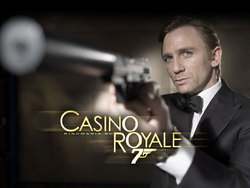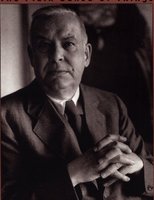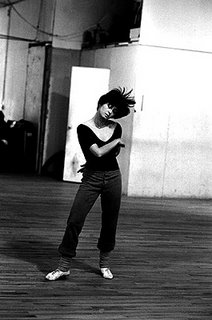
Chris Forhan's poem
"My Almost-Daughter, My Nearly-Was Son" is one of the more interesting pieces Slate has published in recent weeks, and it's intriguing not so much for what many readers would assume is a man who harbors grave guilt and regret for not having children, but rather that it might actually be a boast of a self-actualized sort who is convinced that he (or she) made a sound and sensible decision to not have kids at all. I'm reading this not as thinly disguised regret, a rather easy interpretation to arrive at, but instead as evidence of an imminently sane mind.
All that rain that blathered on the patio, leaves
lifting and twisting, a demented semaphoreAlthough the narrator , whether male or female,
has obviously been tempted to join with another and endeavor to have children and raise them in the world, the passage above gives us a firm clue that the world as is held in low regard, an ill-fated place not worth bringing children into. Rain, usually used as the poetic symbol for various Big Ideas and Emotions for which the reality for which it stands wins out and grandly transforms or dismantles a poet's egocentricity about how the world works (Natural Law always trumps My Will)
is in this line made into a nuisance, a bothersome noise that signifies no messages or meanings but instead "blathers". Leaves, likewise an easily ceased image used to subtly underscore the ironic effect of nature's finalizing essence, can only twist uncontrolled in the ugly weather, at best
"semaphoring" irresolute gibberish.It is a subjective take on one's
existence in a world they see as intrusive and bothersome. One needs to assume the age old practice of willingly suspending one's disbelief [en.wikipedia.org] to read the poem on its own terms and then deciding the merits afterwards.It makes for better critical practice.
What the narrator of the poem does, along with justifying his or herself for not having children, is to reject the external world of life processes, preferring their distractions of work, clarinet practice, varied forms of busy mental gymnastics. Such a personality , with no use for others or life outside their pitifully reduced existence, rain would indeed seem to "blather", seeing the weather condition not as a bringer of growth and fresh air, but only a massive and incoherent interference with their slight agenda. It helps to determine what the mood and prevailing psychology of a work is before condemning it
out of hand.
If nothing else, Nahron's poem does not blather, something associated with run on sentences and unfocused , unshaped subject drift. "My Almost-Daughter, My Nearly-Was Son", whether you like it or not, is concise, tight, and has a point, delivered with a light touch irony. It is possible to not like the poem, but a better critique
is expected as to why it fails. I think it works at every level.
Forhan's narrator wants none of this chaos, this controversy, wants nothing at all to do with being responsible with teaching children his miserable
wisdom about the world he or she is loath to live in.The character weighs the ups and downs of being a parent and prefers their relative isolation, the hermit like concentration on their projects
Those overtime nights in the ice factory, eyeing gauges, greasing gears:
that's one thing. And the hours of clarinet lessons
... I hired myself
to crack that code, kept busy not conceiving you. I peopled
the past, got safely sad about that. I hammered together
a hut in the back of my brain to crawl inside and rest
from the labor of making it.This is a tragedy of a kind, and one does here the
regret somewhere between the words, but Forhan
keeps a sharp focus on the terse and bitten-off cadence. The diction is straight forward, clipped, almost military, and the words themselves are not especially poetic, being rather plain and undecorated with catapulting syllables.
The poem is a monologue, really, and it's aim is to convey the sad fact of someone choosing relative isolation over raising a family even as the narrator seems to brag about the soundness of their decision. The tragedy, of course, is that the narrator is aware of what he or she has missed out on and the fact that the matter weighs on his or her mind (in the form of this poem/monologue) indicates a fragile balance between competing needs. The poem sounds like rules ritually referred to, like campaign points, to shore up encroaching anxieties over what was missed, what was not fulfilled.
These words, a rhetorical fort defending his or her decision to dine alone for all time, hurt the narrator even as the words are said. In explaining the decision, one must again ponder the quality of life that is missed. It's obvious what takes place off stage, when the voice recedes, which I take to be a continued wondering about how things might have been different.
The poem seems to me to hold out the possibility of conception, labor, production. I don't know that it pins down an emotion as concrete as regret about not having children, but it certainly acknowledges a powerful impulse to want children (otherwise they wouldn't be almost born).
The mastery Nahron reveals here is
astounding, in that the poet reveals precisely an opposite set of contrary emotional lows without a
word written about such low-born states of the soul. Our narrator's crimped protests of stoic self-sufficiency reveal a loneliness that is at the core
of every man, woman and child.
It touches a nerve, indeed. I never had the chance to have children, and this straight, middle aged male finds great solace and joy in playing with his grand nieces and nephews. I'm lucky that my family lives mostly in the same area. Still, I recognize this narrator's decision to remain alone, childless and sans mate ( we assume)as a passive aggressive way of saying "fuck it" and then withdrawing from even the most banal interactions of social activity.
Think of Paul Simon's song "I Am A Rock". These are folks we need, finally, to have sympathy for and to recognize within ourselves isolating habits and negative thinking that are to be fended off, a needed task if any happiness is to be possible for us.
This poem has the feeling of someone quite suddenly compelled to explain their choices when pressed for answer, with the response coming across as compressed, in hard bricks of rationalization ,
characterized by a flat calm of someone who has worked on their reasoning in the "hut" of his or her mind for years and has reduced it to a few sentences they think have the clarity of revelation.
Those words said, there is nothing more to say on the matter.









